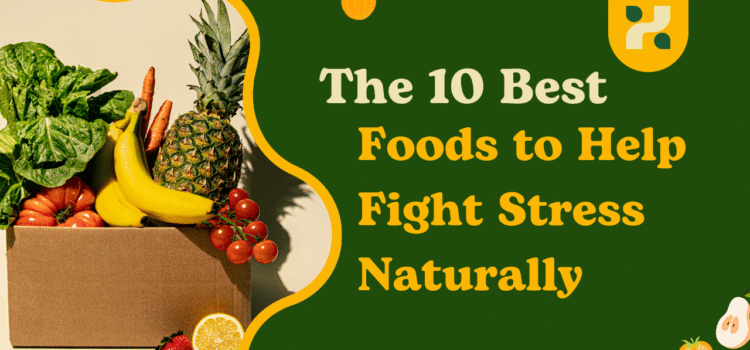
The 10 Best Foods to Help Fight Stress Naturally
Stress is a daily reality for many Americans—from work pressure and family demands to financial worries and health concerns. While meditation, exercise, and proper sleep are essential tools, what you put on your plate plays a powerful role in how your body copes. Switching to stress-fighting foods not only nourishes your body but supports your mental wellness from the inside out.
Inspired by Everyday Health’s dietary guidance and supported by leading research, here are the 10 best foods to help fight stress—along with smart strategies to weave them into your busy life.
1. Leafy Greens (Spinach, Kale, Swiss Chard)
Leafy greens are rich in magnesium and folate, vital nutrients that help regulate cortisol and support neurotransmitter production like serotonin and dopamine. These nutrients help calm your nervous system and ease stress. A balanced anti-inflammatory diet focused on whole produce has been linked to lower cortisol levels
2. Fatty Fish (Salmon, Tuna, Mackerel)
High in omega-3 fatty acids such as EPA and DHA, fatty fish supports brain health, reduces mental inflammation, and may help lower anxiety biomarkers. Abbott nutrition expert Matthew Kuchan explains that omega-3s and vitamin E found in fish and avocados improve blood flow to the brain and reduce stress-related oxidative damage
3. Berries (Blueberries, Strawberries, Raspberries)
Packed with antioxidants like anthocyanins, berries help protect your cells from stress-related oxidation and support the brain’s mood centers. Links between fruit intake and improved calmness and happiness have been recognized in large epidemiological studies
4. Dark Chocolate (≥70% cacao)
A small serving of dark chocolate offers flavonoids, magnesium, and phenylethylamine—all of which promote relaxation and help reduce cortisol. Research shows mood lifts and mental clarity are possible with regular dark chocolate consumption—without the sugar crash
5. Avocados
Avocados are a nutrient-rich source of magnesium, potassium, B vitamins, and healthy fats—all key to maintaining balanced cortisol, regulating mood, and supporting cardiovascular health during stress responses
6. Nuts & Seeds (Almonds, Walnuts, Pumpkin Seeds)
These small but mighty foods boast healthy fats, magnesium, zinc, and selenium—nutrients linked to neurotransmitter balance and stress resilience. Eating nuts daily has been associated with improved emotional well-being and cognitive endurance
7. Fermented & Probiotic Foods (Yogurt, Kefir, Sauerkraut, Kimchi)
Gut health directly impacts stress: fermented foods supply probiotics that support the gut-brain axis and promote serotonin production. Harvard and Cleveland Clinic studies link probiotic intake with reduced anxiety and improved mood
8. Bananas
Bananas provide heart-healthy potassium, tryptophan, and B6—all essential for serotonin and GABA production, calming nerves and improving sleep. Easily portable, they also help maintain blood sugar stability during stressful energy dips
9. Whole Grains (Oats, Brown Rice, Quinoa)
Complex carbs stabilize blood sugar, which in turn supports serotonin synthesis and consistent energy throughout the day. Mayo Clinic experts advise choosing whole grains over refined ones to manage anxiety and stress over time.
10. Green Tea
Green tea contains L‑theanine, an amino acid that promotes alpha brain wave activity and relaxation without sedation. When combined with modest caffeine, it enhances focus and reduces stress hormone levels—making it a calming daily ritual .
Integrating These Foods into Your Routine
Everyday Health emphasizes the role of balancing meals, practicing mindful eating, and swapping stress-trigger choices like sugary snacks for nutrient-packed alternatives. Here’s a quick guide to making these changes:
-
Breakfast: Oatmeal with berries, banana, and chopped nuts.
-
Snack: Yogurt with sliced almonds or dark chocolate and green tea.
-
Lunch: Salmon, quinoa, and mixed greens bowl.
-
Snack 2: Apple or banana with nut butter.
-
Dinner: Stir-fried veggies with tofu or chicken plus fermented sauerkraut or kimchi.
-
Evening Ritual: Warm herbal tea or green tea and a small dark chocolate square.
Also, practicing mindful eating—such as focusing on flavors, chewing slowly, and avoiding distractions—helps reduce emotional eating, a common stress response .
Expert Takeaways & Balanced View
-
Chronic stress affects appetite and triggers cravings for sugar and processed foods. A nutrient-rich, whole-food diet helps counteract these impulses and improve mood stability .
-
The GAIA Study and similar research show that antioxidant-rich, anti-inflammatory dietary patterns—like Mediterranean or Japanese washoku—reduce burnout, anxiety, and fatigue.
-
While diet plays a crucial role, it works best when combined with exercise, adequate sleep, and stress-management strategies like deep breathing or mindfulness practices.
When stress feels overwhelming, nourishing your body with the 10 best foods to help fight stress can be a calming, proactive step. Each food supports key mood and mental health mechanisms—from cortisol balance to brain-gut signaling. By making simple swaps and enjoying mindful, balanced meals, you’re not just supporting your physical health—you’re building emotional resilience too.
Start small: swap processed snacks for berries and nuts, swap soda or coffee for green tea, and build a daily routine grounded in whole foods. Small, consistent changes create sustainable habits—and over time, they help transform how you feel.












